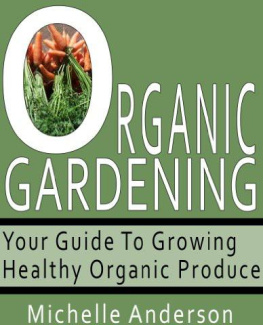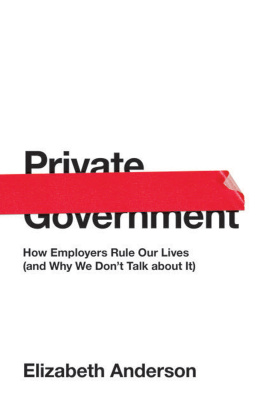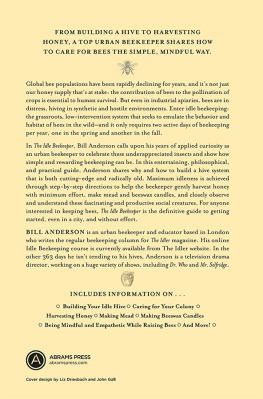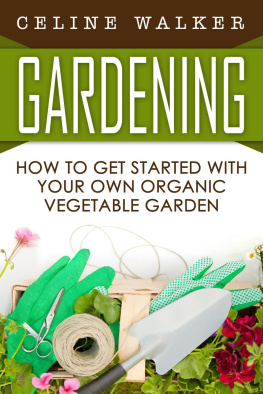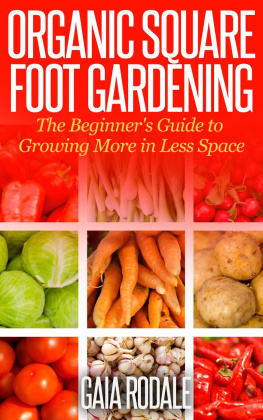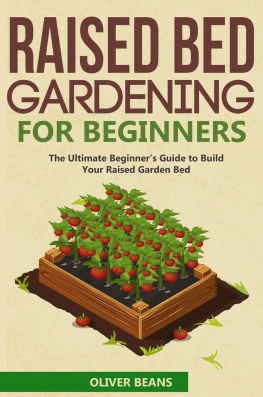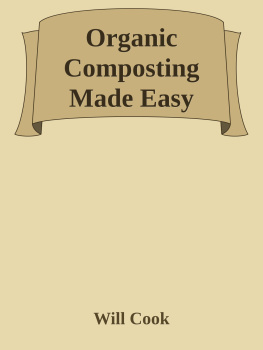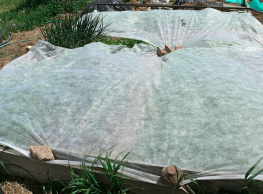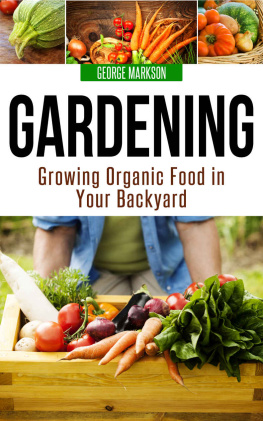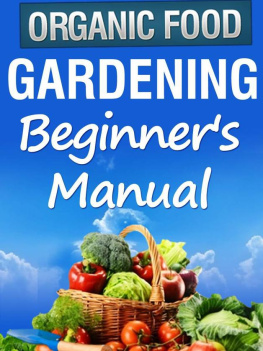Organic Gardening: Your Guide to Growing Healthy Organic Produce
by Michelle Anderson
2012, Michael Anderson. All rights reserved.
This book contains material protected under International and Federal Copyright Laws and Treaties. Any unauthorized reprint or use of this material is prohibited. No part of this book may be reproduced or transmitted in any form or by any means, electronic or mechanical, including photocopying, recording, or by any information storage and retrieval system without express written permission from the author.
Disclaimer:
The information contained in this book is for general information purposes only. This book is sold with the understanding the author and/or publisher is not giving medical advice, nor should this book replace medical advice, nor is it intended to diagnose or treat any disease, illness or other medical condition.
While we endeavor to keep the information up to date and correct, we make no representations or warranties of any kind, express or implied, about the completeness, accuracy, reliability, suitability or availability with respect to the book or the information, products, services, or related graphics contained book for any purpose. Any reliance you place on such information is therefore strictly at your own risk.
In no event will we be liable for any liability, loss or damage including without limitation, indirect or consequential loss or damage, or any loss or damage whatsoever arising from loss of data or profits arising out of, or in connection with, the use of the material or the interpretation of the material contained in this book.
Dedication:
This book is dedicated to my family, who has had to live with the ups and downs I've experienced while growing my organic garden plot. Thanks, guys. I love you all.
Contents
Introduction

Gardening isn't as difficult as people tend to want to believe it is.
It isn't hard to plant a seed, water it and watch it grow. In fact, most of us did exactly that in grade school and watched as our budding plants sprouted from the rich soil in the Styrofoam cup we'd planted them in. While I'd be lying if I told you organic gardening was that simple, it's the same basic process, just on a much larger scale.
Gardening is a labor of love for most gardeners.
Most of us don't have to rely on the food we get from our gardens, but there's something to be said about self-sufficiency. There's also something to be said about the satisfaction felt while getting on one's hands and knees and working the Earth. If there's a better way to become at one with nature, I haven't found it.
I love sitting in and around my garden and watching how alive it is. Bugs and spiders scurry around. Birds, bees and butterflies flutter about. Rabbits, squirrels, gophers, deer. You never know what sort of wildlife may decide to make an appearance.
Whether you're passionate about plants or flowers or are looking for a cleaner and healthier way to grow produce, organic gardening is the way to go. You can create a sustainable garden that's friendly to the environment and is capable of producing the plants you want it to for generations to come.
Organic gardening is somewhat of a lost art, albeit one seeing a resurgence in recent years.
In this day and age of quick and easy processed foods, there's a growing group of gardeners who refuse to take the easy way out. We stand united against the constant barrage of chemical-laden foods and produce that proliferates grocery stores today. We don't use pesticides, herbicides, chemical fertilizers or any other synthetic materials in our gardens and guess what? Our families and our land are healthier for it.

The agricultural chemical industry would have you believe their chemical compounds are safe to use. They're powerful corporations able to grease the right pockets to keep momentum rolling in their direction. They thrive because people come to rely on the fertilizers, pesticides and herbicides they're peddling as the answer to all problems.
Organic farming is a threat to their bottom line. If they didn't feel threatened, do you think they'd be spending millions of dollars trying to lobby for more regulations that only serve to hamper organic farmers from selling their produce on the open market?
Whether you're a home-gardener wetting your feet with a small organic garden or an experienced vet looking to expand your knowledge, you'll appreciate the tips and techniques set forth in this book.
What is Organic Gardening?
Organic gardening is an environmentally-safe form of gardening undertaken with the intent to eliminate harsh chemicals, herbicides and pesticides both from the land and from the dinner table.

Organic gardening is saying no to the chemicals commercially available foods are doused with.
While there are as many definitions for organic gardening out there as there are types of plants, it all boils down to one basic tenet. Organic gardeners don't use synthetic chemical compounds on the plants they grow in their gardens, instead opting to harmonize the plants in their gardens with nature.
They key to successful organic gardening is taking the steps needed to ensure your soil stays healthy and rich. This is done by replenishing the resources consumed by your garden by adding organic matter back into the soil. You can create your own organic matter through a process called composting, which will be covered in detail in a later chapter.
A successful organic gardener picks plants suitable to the site where they're going to be planted. Trying to force a plant to grow in an environment not conducive to that plant's growth is a source of frustration for many budding organic gardeners. At the very least, it's going to take a lot of extra care and will consume more resources than a plant that's a good choice for the location.
This form of gardening isn't for the time-pressed individual. You have to be willing to invest the time it takes to be in tune with what your garden is telling you. The key to a successful organic garden is identifying problems before they get out of control and taking the steps necessary to put them to rest.
Why Go Organic?
There are a number of reasons people decide to go organic.
The biggest reason driving people to go organic is the fact that organically-grown foods are healthier than their chemical-laden counterparts. Studies have shown time and time again that people who consume organic foods are healthier overall than those who don't. It's hard to tie specific diseases and illnesses to non-organic foods, but the healthier lifestyle lived by those who go organic has proven an effective means of avoiding disease and illness.
Do people who eat organic foods still contract diseases and get sick? Of course they do, but the overall rate at which it happens is significantly lower. The reasons for this can likely be attributed to a number of concentric factors, some direct and some indirect.
Indirectly, people who consume organic foods tend to be more in tune with what's healthy and what isn't. They lead a healthier lifestyle and are physically healthier overall because of it.
In my opinion, the lack of chemical residue is the biggest reason people who go organic are healthier.
Trace amounts of the chemicals contained in herbicides, pesticides and fertilizers all make their way into your system when you eat non-organic produce. A single serving of food containing these trace chemicals probably isn't going to do too much damage. The problem lies in the fact that the human body doesn't recognize them and can't process them. The only thing your body can do is store them away somewhere like your brain, in your fat deposits or in your bones.
Next page
